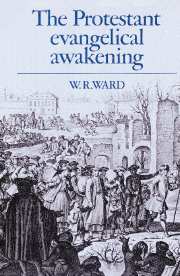Book contents
- Frontmatter
- Contents
- List of maps
- Preface
- List of abbreviations
- 1 The Protestant frame of mind in the eighteenth century
- 2 The beginnings of revival: Silesia and its neighbours
- 3 Salzburg and Austria
- 4 Zinzendorf and the Moravians
- 5 Revival in the South-West of the Empire and Switzerland
- 6 Revival in the North-West of the Empire and the Lower Rhine
- 7 Revival in the American colonies
- 8 Revival in the United Kingdom
- Conclusion
- Index
7 - Revival in the American colonies
Published online by Cambridge University Press: 17 March 2010
- Frontmatter
- Contents
- List of maps
- Preface
- List of abbreviations
- 1 The Protestant frame of mind in the eighteenth century
- 2 The beginnings of revival: Silesia and its neighbours
- 3 Salzburg and Austria
- 4 Zinzendorf and the Moravians
- 5 Revival in the South-West of the Empire and Switzerland
- 6 Revival in the North-West of the Empire and the Lower Rhine
- 7 Revival in the American colonies
- 8 Revival in the United Kingdom
- Conclusion
- Index
Summary
Revival in the American colonies shared the characteristics of revival in Europe; friends and enemies alike treated it as a pan-Protestant phenomenon. Jonathan Edwards discerned a distinct stage in the cosmic history of redemption in the reforms of Peter the Great, here regarded as a surrogate Protestant, the success of missions among the Tartars, the American Indians and on the Malabar coast, and of revivals proper in New England and most especially ‘in Germany, through the endeavours of an eminent divine there, August Herman Frank, professor of divinity at Halle in Saxony’. Conservative opponents of the revival also secured a European resonance for their views, and put the synoptic vision of the revivalists to their own use. They perceived ‘a wonderful WANDERING SPIRIT’ which
now haunt[s] Moravia, and many other places in the German Empire; has of late been very troublesome in England; and has been seen, felt and heard by thousands in America … honest folks in Scotland … get by its influences such a second-sight, as they can easily see their neighbours' hearts and intentions … Such as have read the records of Germany and England al[l]edge that it was the same [spirit] who guided the incomparable Jacob Behmen in writing his religious jargon and dark nonsense: that possess'd the enthusiasts of Munster.
The immigrant Babel in the Middle Colonies, especially Pennsylvania, was certainly immense; it was here that revivalism was first developed, and that there were the greatest concentrations of the Dutch, German and Swiss peoples whose history in Europe has concerned us.
- Type
- Chapter
- Information
- The Protestant Evangelical Awakening , pp. 241 - 295Publisher: Cambridge University PressPrint publication year: 1992



